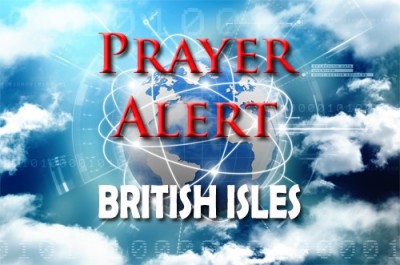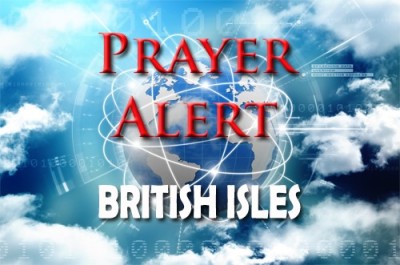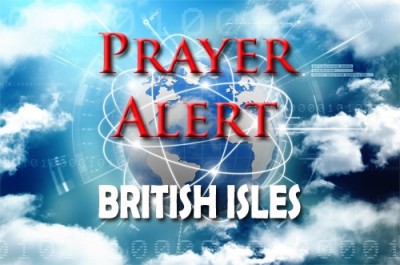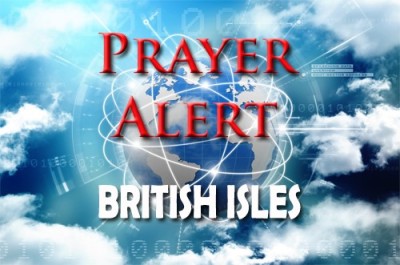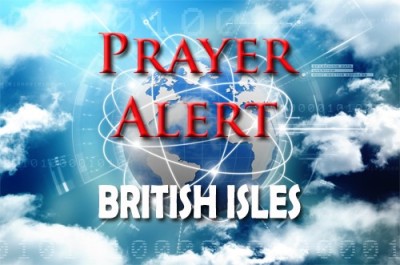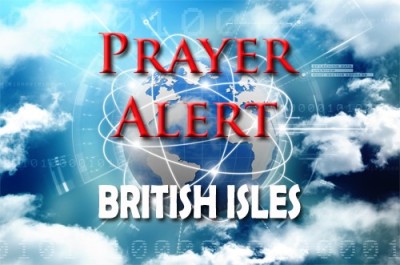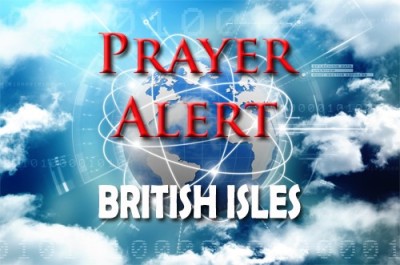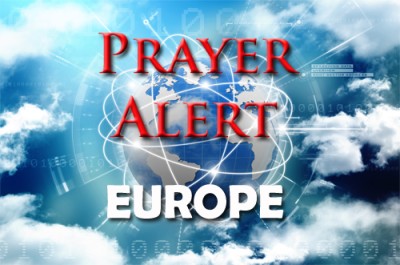Storm Eunice: rare red warning
17 Feb 2022The Met Office released a red weather warning (the highest level) for 18 February for parts of south-west England and south Wales as there is a danger to life from flying debris. Gusts of 90 mph would cause significant disruption. Damage to homes, train cancellations and power cuts are also likely. There is a lower level warning for wind in the rest of Wales and most of England. Storm Eunice comes 48 hours after Storm Dudley caused widespread disruption and power cuts in Scotland and north England. Cornwall council warned that the winds will coincide with high spring tides along the coastline, possibly leading to flooding. The storm is likely to be as powerful as the one in 2014 which saw homes evacuated amid widespread floods.
Changing communities - prayers
17 Feb 2022In our communities we see pockets of prejudice and persecution, and in the marketplace we have to watch out for fraud and dishonesty - but, Father, we know you can bring change and establish kingdom values in our land. So we ask You to call, raise up, and anoint men and women to bring transformation to the hard places. May 2022 be the turning point as Your Church delivers love and compassion to deprived areas. Where there is despair bring hope; where there is grief, release Your healing. Father, we ask You to expel the enemy from his strongholds and flood every dark area with your light and power. Release forgiveness, reconciliation and peace to communities experiencing prejudice and animosity, and strengthen Your church as they step out in faith to proclaim freedom for the captives. Let this year be the year of the Lord’s favour as wounds within cultures are healed.
Petition about Pakistani Christian girl
17 Feb 2022Christian MP Fiona Bruce has handed a petition to home secretary Priti Patel, to raise continued concerns about a Pakistani Christian girl, Maira Shahbaz. At just 14 she was kidnapped, forced into marriage and converted; she escaped, only to be forced into hiding after her abductor accused her of apostasy. More than 12,000 people signed an Aid to the Church in Need (ACN) petition calling on Boris Johnson to grant asylum to Maira. ACN’s press officer John Pontifex said, ‘We are extremely delighted that Fiona Bruce has once again taken the trouble to reach out to Priti Patel and make this fresh appeal on behalf of Maira. I have been in touch with Maira almost every day, sometimes talking about her situation. She says to me: “I feel like I am in a prison, I can’t go out, I’m stuck, I don’t have enough to eat. What can you do to help me?”’
‘Transphobic’ six-year-old
17 Feb 2022Parents Sally and Nigel Rowe were warned that if their six-year-old child expressed confusion about another pupil wearing a dress and used incorrect pronouns it would be unacceptable behaviour. A letter from the headteacher and governors said that pupils risked being viewed as transphobic if they showed an inability to believe a transgender person is actually a ‘real’ female or male. The parents have withdrawn both their sons from the school and been granted permission for a judicial challenge to the Department for Education’s (DfE) decision to provide the guidelines to state schools. A hearing is expected within six months, and the DfE is defending the claim. The parents withdrew their eldest son in 2015 after he became confused about another boy wearing girl's clothes. Two years later, they are raising the issue again after their second son was confused about another pupil who identified as ‘gender fluid’, alternating their appearance on various days of the week.
University strikes
17 Feb 2022In 2020 staff at 74 universities held a 14-day strike over pensions, pay, and conditions. Now staff at 68 UK universities will be taking part in a wave of strike action over the next three weeks. Some are striking over pay and conditions, others over pensions: but for most taking action, it is over both. The University and College Union, which represents staff at institutions across the UK, has demanded a £2,500 pay increase for members, an end to ‘pay injustice’ and zero-hours contracts, and action to tackle ‘unmanageable workloads’. The dispute over pensions has been rumbling on for over a decade, but has been reignited by a valuation of a pension scheme used by academic staff - the Universities Superannuation Scheme (USS). Those involved in the action include some of the UK's biggest in terms of student numbers - such as the Open University, University College London, and the University of Manchester.
16- and 17-year-olds in care are neglected
17 Feb 2022The actress Samantha Morton has accused the Government of being ‘neglectful’ towards 16 and 17-year-olds in care. The law changed in September 2021 so that under-16s are in regulated settings like children's homes or foster care. But others go into supported or semi-independent accommodation such as a hostel. The charity Article 39 said that 22 children aged 16 and 17 in supported accommodation died between 2018 and 2020. The charity said the policy was discriminatory and ministers had not properly consulted youths placed in supported accommodation. It recently took the Government to court. Judgment is expected in the next few weeks. A 15-year-old living in a very supportive environment would be moved when they turn 16 into rented, shared accommodation alongside someone who may have been released from prison with a tag. Article 39's director said extensive research showed children in this type of housing are vulnerable to criminal or sexual exploitation. Many feel lonely, isolated and abandoned when placed in properties on their own.
Agony of living near polluted rivers
17 Feb 2022Donna Anderson loved living near the Trent and Mersey canal, but when it rained her garden was flooded with sewage from the canal and nearby streams. She has had to install extra drainage. It is believed the culprit is Severn Trent Water dumping sewage once a month on average into Barton-under-Needwood stream. This is not a nasty isolated incident. Dozens of people’s lives are blighted by raw effluent being pumped into rivers, canals and streams by water companies across the country. Water companies can discharge raw sewage into rivers in ‘exceptional circumstances’ of heavy rainfall which could cause flooding, but it is happening with alarming regularity. In 2020, sewage spilled into rivers 403,171 times, with serious consequences. Sewage is damaging the quality of over a third of rivers. The Daily Telegraph is calling for action to protect England’s waterways from devastating pollution: see
Ukraine: no other path than NATO
17 Feb 2022Ukraine’s president has said joining NATO would guarantee his country's security. He says it will not be easy, but there is no other path for Ukraine. The UK's defence secretary, Ben Wallace, said Russia will be judged by its actions. ‘We've seen the opposite of some of Russia’s statements. We've seen an increase of troops over the last 48 hours up to 7,000, we've seen a bridge constructed from Belarus into Ukraine - or near Ukraine. At the moment Russia’s troop build-up continues.’ Wallace says NATO is united and is ‘deadly serious on how we're going to face the threat being posed to Ukraine and potentially our security’. Speaking after a meeting of defence ministers, he says it's becoming ‘tragically normal’ for Russia to use ‘malign activity and threats to try and get its way’ and Europe has to respond to that, adding, ‘This is a real challenge to the stability of Europe.’
